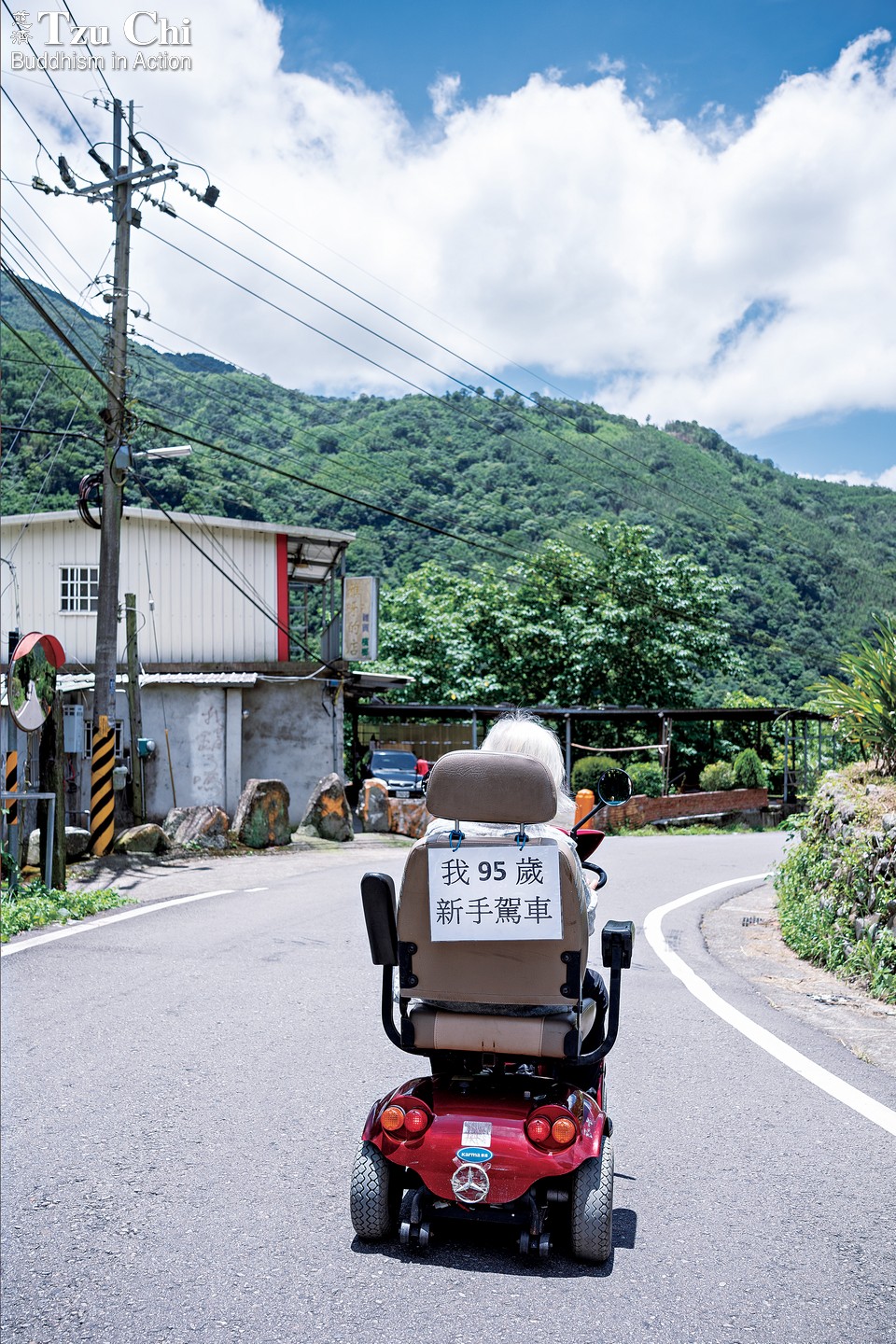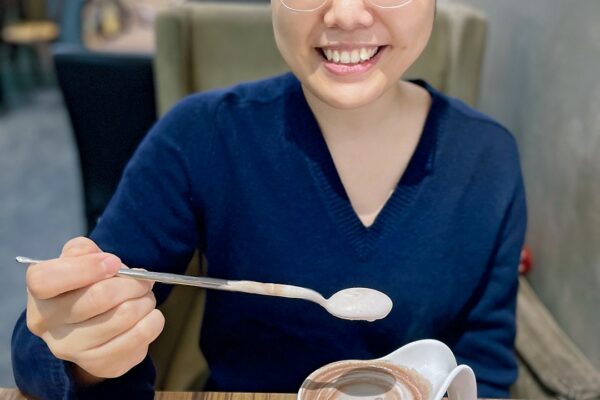By Yeh Tzu-hao
Translated by Wu Hsiao-ting
Photos by Yan Lin-zhao
Tzu Chi volunteers in Taiwan recycle, repair, and deliver assistive devices directly to people’s homes, providing impactful solutions for the challenges of aging and disability.
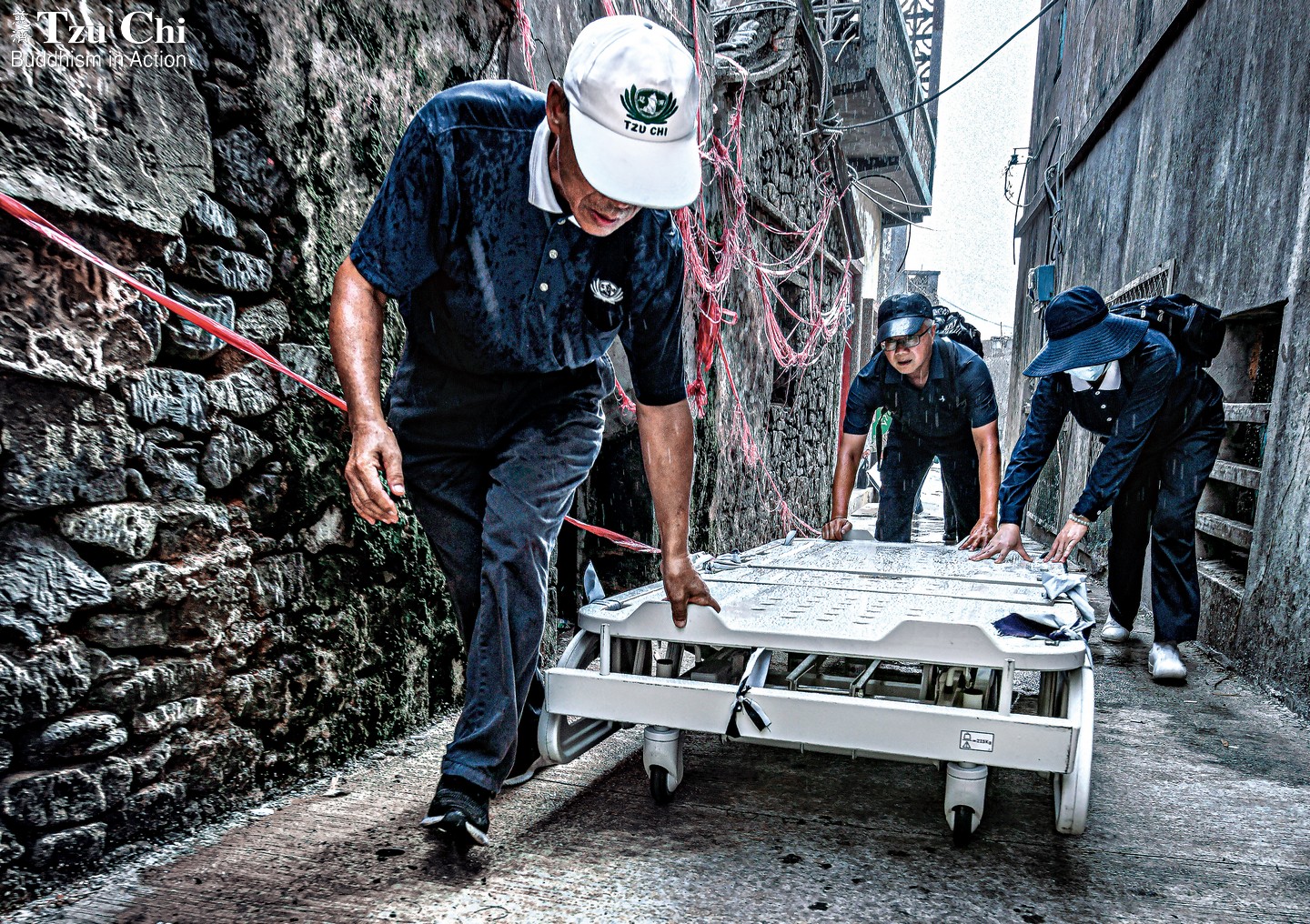
Tzu Chi volunteers brave rain and navigate through narrow alleyways on Penghu’s Hua Islet to deliver an electric bed, weighing over a hundred kilograms, to a household.
With this standing wheelchair, he can manage getting up and down independently—ascending gradually when he chooses to stand and descending slowly when he prefers to sit, without the assistance of another person,” said Chen Hui-xian (陳惠仙), referring to her father.
Chen works in a long-term care facility, engaging the elderly in activities to enhance their physical and mental functions, aiming to delay disability. She plays a similar role in her personal life for her 88-year-old father. He was diagnosed with Parkinson’s disease five years ago and has now reached a point where he can no longer stand or even maintain a sitting position on his own. He needs help with almost all daily tasks, including getting in and out of bed, using the bathroom, and eating. He had a foreign caregiver, but she had to move him more than ten times a day, resulting in a back injury that forced her to resign. In response, Chen and her sister, who works as a home care provider, take turns visiting their brother’s home to care for him.
To increase her father’s independence, Chen applied to the Tzu Chi Eco-Friendly Assistive Device Program, which provided an electric hospital bed, a standing wheelchair, and other equipment. She secures her father every day into his standing wheelchair, fastens the chest, waist, and leg straps, hands him the remote control, and lets him control standing and sitting on his own. Mr. Chen’s physical and mental well-being has improved with the assistive devices, enhancing the overall quality of life for the entire family.
Reflecting on this experience, Chen remarked, “In the very beginning, I questioned why Tzu Chi put so much effort into assistive devices when our government already offered support. However, I’ve since come to realize the strong societal demand for such equipment, and we need all the help we can get.”
Hong Shu-ying (洪淑英) is another beneficiary of the Tzu Chi program. She applied for assistive devices from the program before her husband returned home from the hospital for his final care. Tzu Chi volunteers prepared and delivered an electric bed, wheelchair, and shower chair to her home. All Hong needed to do was open the door and let the volunteers place the items where they needed to go.
In May 2023, Hong’s husband passed away. Initially, she worried about how to return the assistive devices to Tzu Chi. Volunteers suggested that she focus on completing her husband’s final arrangements before dealing with the devices. When she finally contacted them to take back the equipment, they ensured she didn’t have to exert any effort. “I just opened the door and let them take the equipment away,” she said. Looking back on the support and care she received in the process, she said gratefully: “I benefited from many people’s help. There’s a large team behind this program. The love I witnessed was selfless—more than touching, it was truly heartfelt.”
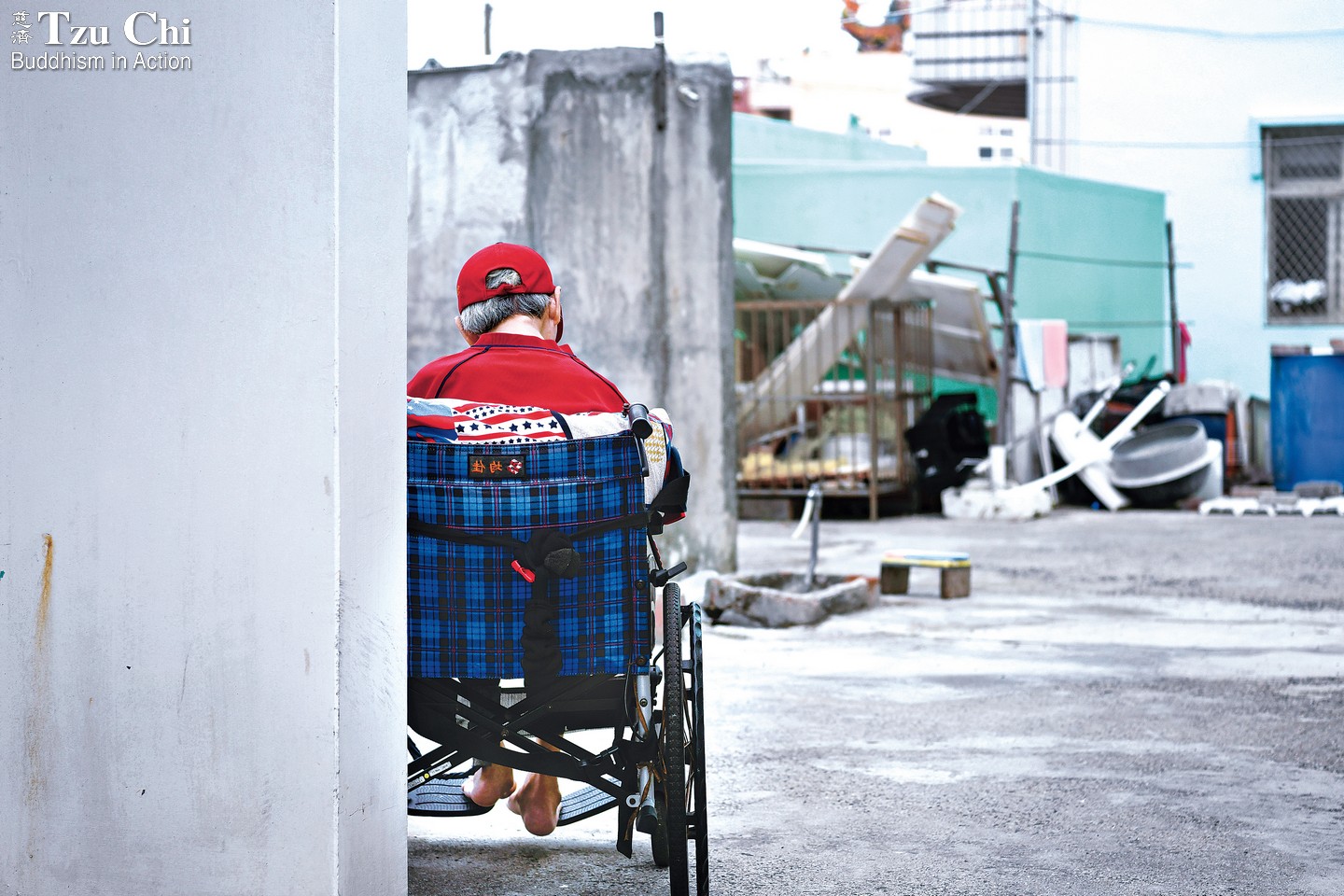
In many remote areas of Taiwan, there is a significant outflow of young and middle-aged populations, resulting in a higher proportion of elderly residents. This demographic shift underscores the increased demand for local caregivers and assistive devices.
Addressing the need
According to estimates by Taiwan’s National Development Council, Taiwan is expected to become a super-aged society by 2025, with individuals aged 65 and above constituting over 20 percent of the population. Challenges accompany this aging trend. Currently, the average life expectancy for Taiwanese citizens hovers around 80 years, but the average “unhealthy life expectancy” has stretched to seven to eight years. Simply put, a significant portion of seniors spends the last seven to eight years of their lives in a state of disability or being bedridden.
The Taiwanese government has created a comprehensive long-term care system to address the care needs of millions of older and disabled individuals. In conjunction, assistive device centers have been established in counties and cities across Taiwan. People eligible for long-term care, holding proof of physical or mental disabilities, or having suffered from occupational accidents can apply for government subsidies to purchase brand-new assistive devices. Meanwhile, individuals with short-term rehabilitation needs can either rent or receive second-hand assistive devices free of charge from local assistive device centers.
Director Yang Chung-yi (楊忠一) of the New Taipei City Assistive Device Center explains: “For example, if the subsidy for a wheelchair is 2,800, and you opt for one priced at 4,000, you only need to cover the remaining cost of 1,200. If you don’t qualify for a subsidy or only require such devices for a short time, like during recovery from an accident, you can use second-hand ones to meet your needs.”
In addition to those assistive device centers established by local governments, the Tzu Chi Foundation, an organization known for its charitable and environmental conservation efforts, established the Tzu Chi Eco-Friendly Assistive Device Program in 2017 to tackle the challenges posed by an aging population. Volunteers clean, disinfect, and refurbish recycled second-hand assistive devices, providing them at no cost to people in need of such equipment, particularly those who are economically disadvantaged.
This charitable initiative has its roots in the environmental protection endeavors that Tzu Chi began in 1990. In response to Dharma Master Cheng Yen’s call for recycling, volunteers began reclaiming materials such as paper and plastic bottles. But soon much more than paper and plastic were being recycled. Many used assistive devices, including wheelchairs and walking aids, found their way to Tzu Chi’s recycling stations when their users no longer needed them, either because they had passed away or recovered from an accident.
Initially, Tzu Chi volunteers treated these assistive devices like regular recyclables. Those in poor condition were disassembled and recycled, while usable ones were cleaned and placed in a designated area within a recycling station for individuals in need. Such items were sometimes given as gifts to Tzu Chi care recipients. Later, volunteers with electrical repair skills began independently fixing and personally delivering such items to people in a community, driven by word-of-mouth.
Such efforts expanded with the widespread use of communication software after 2012. Now volunteers willing to contribute could connect and communicate much more easily, exchanging knowledge on repair methods and cleaning techniques. With such collaboration, volunteers more efficiently refurbished and delivered assistive devices to those in need.
As Taiwan’s society continued to age, volunteers discovered a growing demand for assistive devices during their regular home visits to those in need. Properly disinfected and repaired second-hand assistive devices became increasingly sought after.
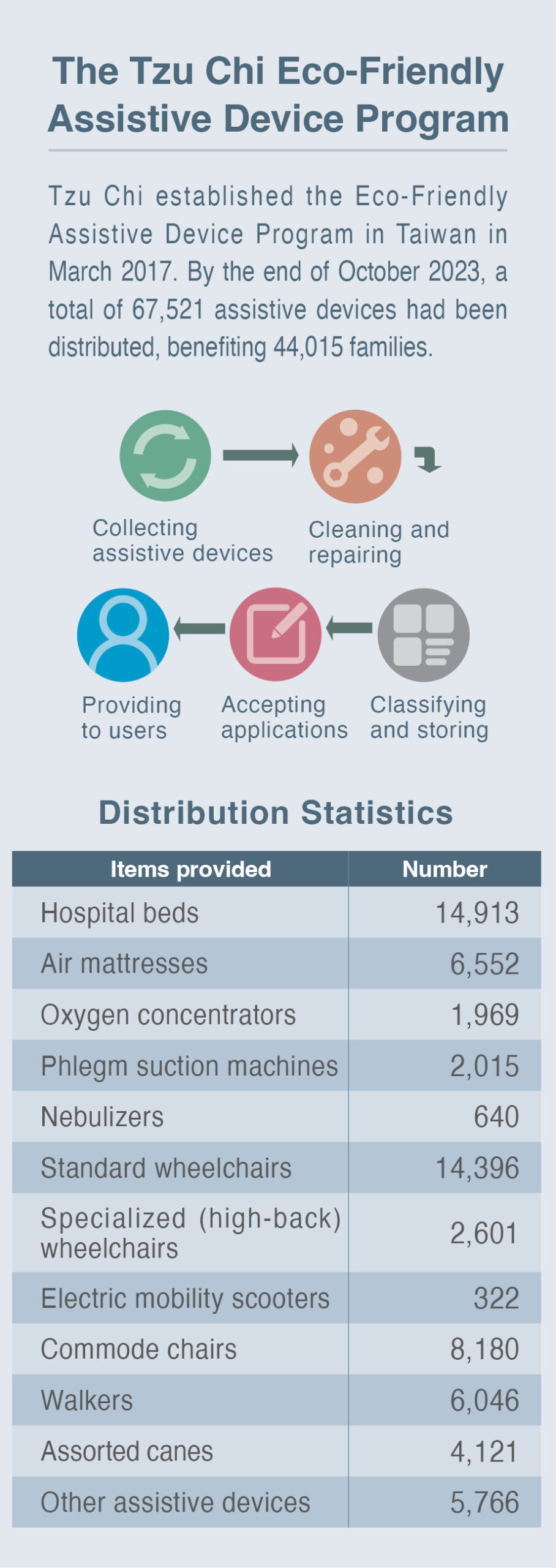
Subsequently, the Tzu Chi Eco-Friendly Assistive Device Program was formally launched, with service outlets established across Taiwan and local volunteers actively participating. The only exception is the Matsu Islands (officially Lienchiang County), which doesn’t have a Tzu Chi assistive device outlet. As of October 2023, over 67,000 assistive devices have been distributed, benefiting more than 44,000 families.
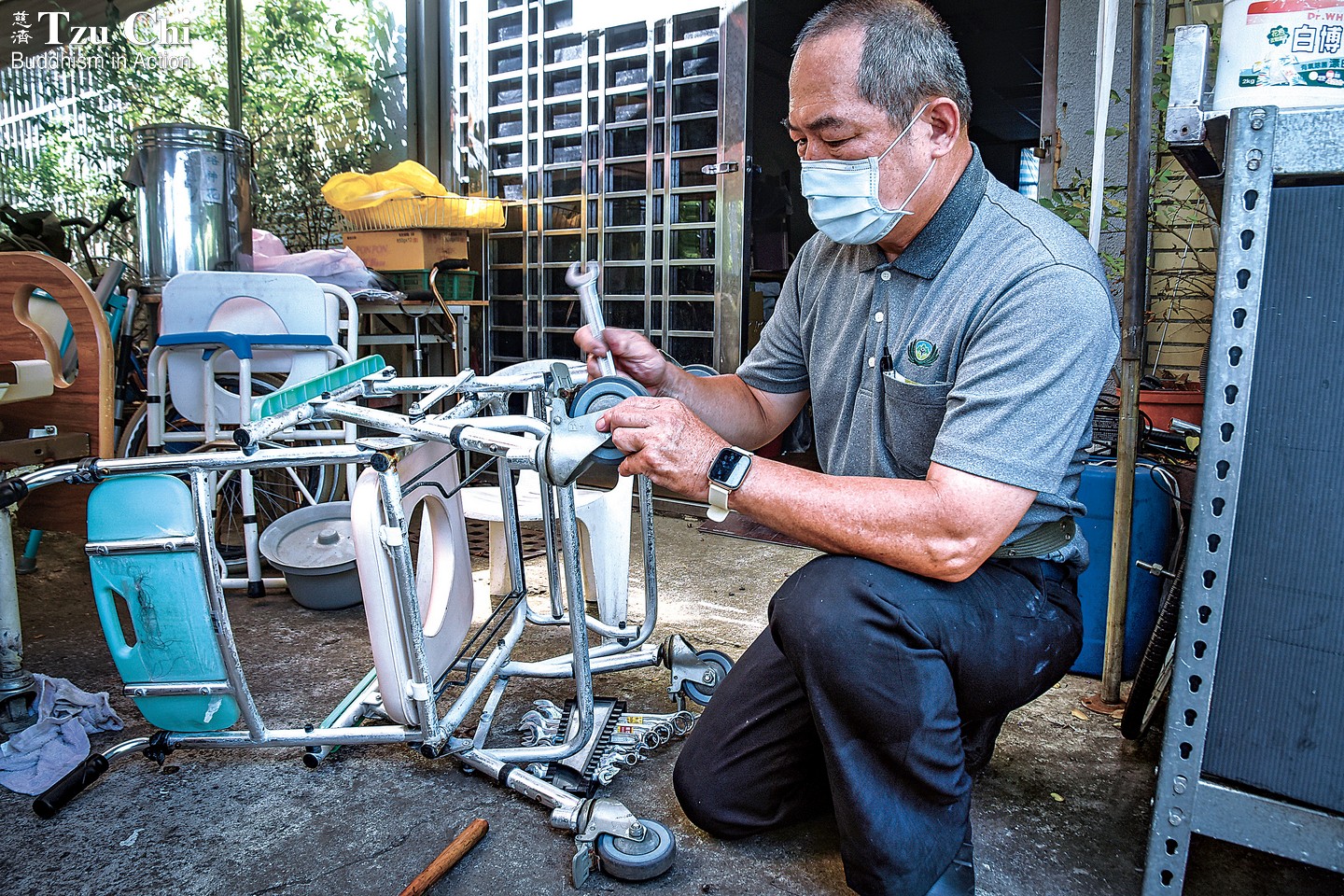
Volunteer Zeng Yao-shan (曾堯山) repairs a commode chair at Tzu Chi’s Gangshan Campus in Kaohsiung, southern Taiwan. Sometimes, an assistive device can be restored to working order with just a wrench and a few screws. Zhu Li-wei
Delivering best wishes
The assistive devices distributed by Tzu Chi have collectively saved the public over four hundred million Taiwanese dollars (US$13,333,000) over the years, which doesn’t include the cost of the services provided by Tzu Chi volunteers themselves. Lu Fang-chuan (呂芳川), the director of the Tzu Chi Department of Charity Mission Development, observed, “Our program protects the environment and cares for people by extending the life of items and relieving suffering.”
To ensure the timely delivery of assistive devices, volunteers have developed skills to adapt quickly on the spot and handle unforeseen challenges. For example, when confronted with narrow apartment stairs that make it difficult to move large hospital beds, they adeptly dismantle the beds into smaller, more manageable units for easier transport, reassembling the pieces upon reaching their destination. Throughout this process, ensuring safety is paramount to prevent accidents and injuries.
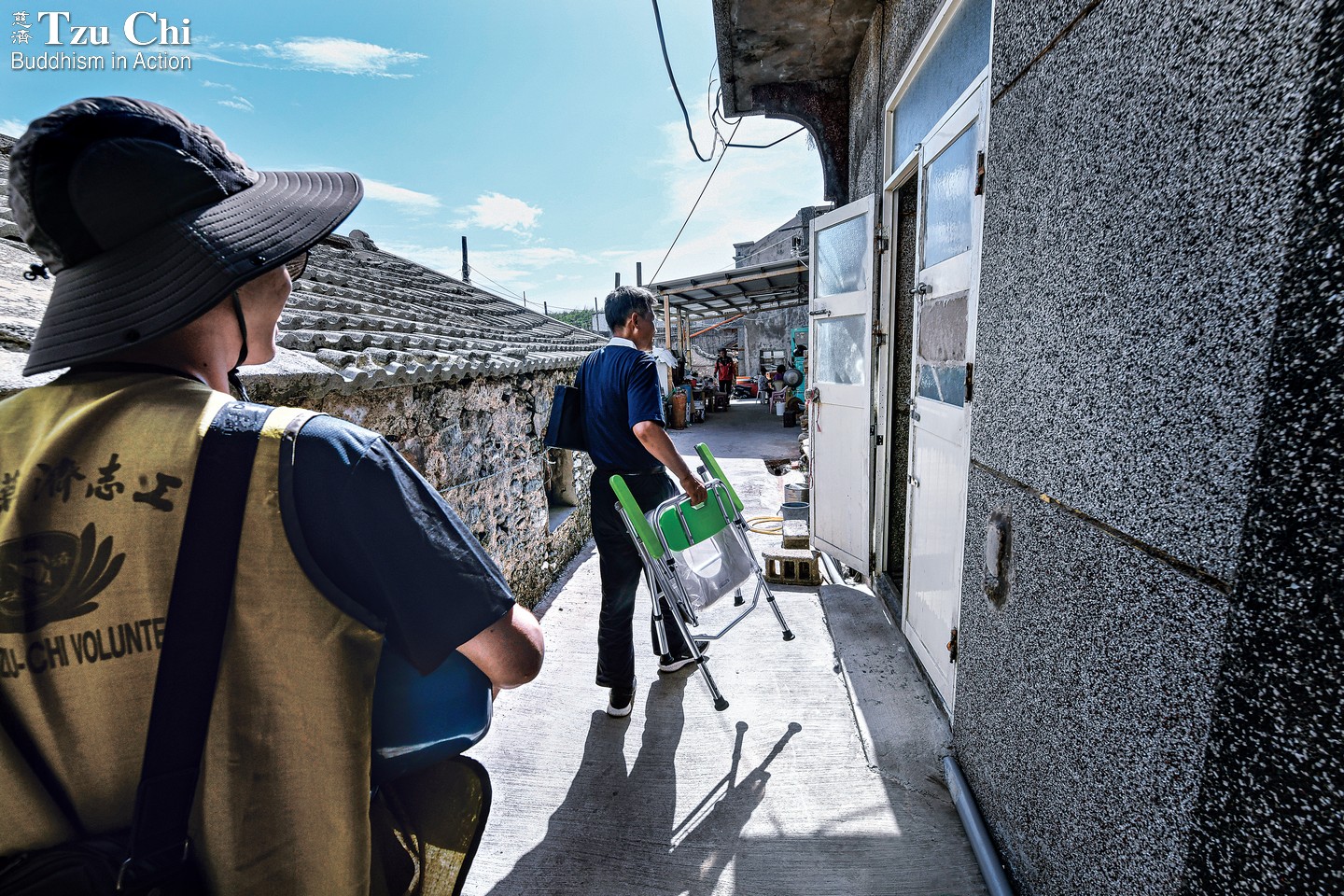
Volunteers deliver a commode chair to an elderly resident living alone on Penghu’s Hua Islet. Since Penghu has many outlying islands accessibly only by boats, volunteers must overcome obstacles to visit households, assess needs, and deliver the required assistive devices.
Tzu Chi volunteer Lin Jin-cheng (林金城) has over 40 years of experience in the construction industry and 23 years of volunteering. He initially thought assistive devices were limited to wheelchairs and commode chairs. It wasn’t until he retired in 2022 and joined the assistive device team in Tucheng, New Taipei City, that he discovered the wide variety of assistive devices available, including electric beds, walkers, and more. He realized that even wheelchairs come in different specifications.
Lin has since handled over 500 wheelchairs and can reassemble one in under two hours. He has also participated in transporting and moving hospital beds weighing over a hundred kilograms (220 pounds) on several occasions. About his work, he says, “Handling and delivering assistive devices is among the most exhausting of all the volunteer services. But once I got involved, I dedicated myself completely to the work because I saw so many people in need of such items. Providing assistive devices directly helps people, so I have no regrets.”
Lin explained that, among all the regions in Taiwan, the assistive devices from the Greater Taipei area are of the highest quantity. These devices primarily come from Tzu Chi’s recycling stations, hospitals, and nursing homes. Sometimes a medical institution will replace old equipment in bulk, then give it to Tzu Chi. Two or three large trucks are needed to pick up and transport such a large donation, which usually includes unwieldy wheelchairs and hospital beds.
“After bringing all the equipment back,” Lin explained, “we carefully evaluate each item. We disassemble items in poor condition to salvage serviceable parts for future use. Those devices that are in relatively good condition are repaired or cleaned to be provided to users.” He added that even outlying islands such as Penghu and Kinmen have received assistive devices from the program.
Based on Social Value UK’s Social Return on Investment methodology, Tzu Chi’s assistive device program creates benefits equivalent to 81.18 times the investment. (Social Value UK is the professional body for social value and impact management in the United Kingdom.) To put it simply, every effort from Tzu Chi volunteers in the program yields over 80 times the benefit for society. These positive impacts are evident in alleviating recipients’ financial burdens, enhancing their quality of life, and improving their sense of security, both physically and mentally.
Tzu Chi’s assistive device program is dedicated to recycling assistive resources and making it easier for those in need to access suitable assistive devices. These endeavors align with the United Nations Sustainable Development Goal 3, “Good Health and Well-being.” As proof of the value it creates, of the three gold awards the Tzu Chi Foundation won in the 2023 Taiwan Sustainable Action Awards, one was in recognition of this program.
Volunteers distributing assistive devices to households perceive their work as more than just providing a practical service—they consider it an act of delivering their best wishes too. While they serve others through this endeavor, they express hope that their efforts can have a ripple effect, inspiring recipients of these devices to contribute to the well-being of others and the Earth, collectively serving the greater good.
An older woman effortlessly navigates her neighborhood on a Tzu Chi-provided electric mobility scooter. To ensure her safety, her hired caregiver has attached a sign to the scooter that reads, “I am 95 years old and a novice driver.” Hsiao Yiu-hwa
